Author: Zen, PANews
The US-listed mining company BitMine has attracted widespread attention in the market for becoming the world's largest enterprise-level holder of Ethereum. With the disclosure of on-chain data, there has been a new round of discussions about the role and impact of institutions in the allocation of crypto assets. Besides Tom Lee, the chairman of BitMine's board, who is always in the media spotlight promoting ETH, another name has been frequently mentioned behind this wave of enthusiasm—Peter Thiel.
As one of Silicon Valley's most controversial and forward-looking investors, Thiel showed interest in Bitcoin and the potential of decentralization early on and has made multiple bets in the crypto industry through his fund. Thiel's investment trajectory not only reflects his judgment on future technological trends but has also shaped the landscape of today's crypto market to a certain extent.
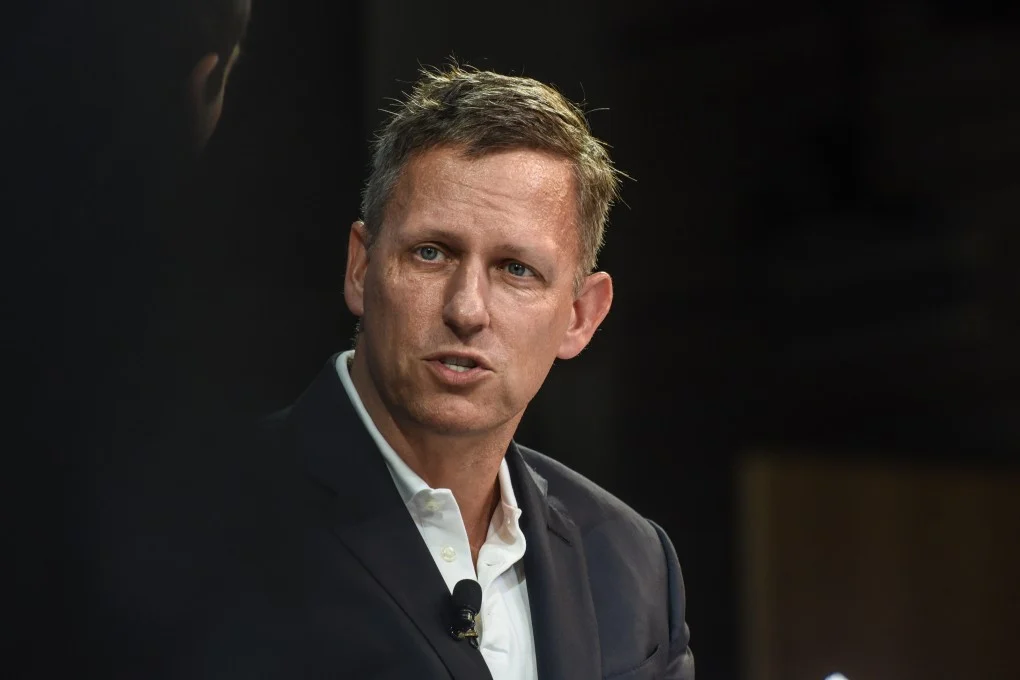
The Godfather of the PayPal Mafia
If one were to find a central figure in the famous story of the "PayPal Mafia," its "Godfather," Peter Thiel, would undoubtedly be the most fitting.
In 1998, Thiel co-founded Fieldlink with Max Levchin, Luke Nosek, and others, which was later renamed Confinity. Due to the commercial failure of its handheld device security software development business, the company quickly shifted its focus to digital wallets and launched the first version of the PayPal electronic payment system in 1999. In March 2000, Confinity merged with X.com, an online financial services company founded by Elon Musk and others, and was officially renamed PayPal in June 2021.
In 2002, eBay announced it would acquire the newly listed company for about $1.5 billion in an all-stock transaction, marking Thiel's first significant wealth leap as a co-founder and the first CEO.
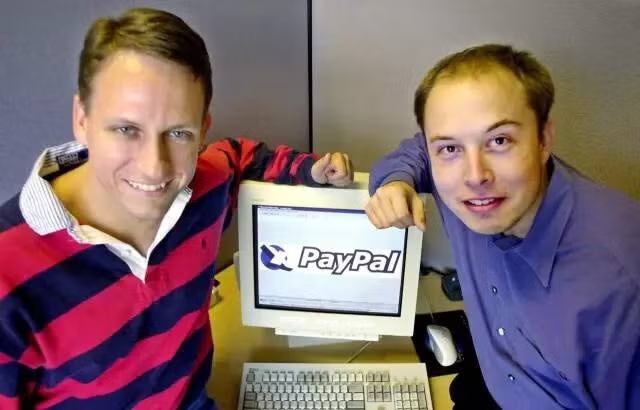
Thiel and Musk
After the sale of PayPal, members of the "PayPal Mafia" dispersed throughout Silicon Valley, embarking on a new wave of entrepreneurship and investment. Among them, Thiel's $500,000 convertible note investment in Facebook in 2004 is often regarded as one of the most representative early investments in Silicon Valley. At that time, Facebook was valued at only $4.9 million, and as its first external investor, Thiel acquired a 10.2% stake and joined the company's board. After Facebook went public in 2012, Thiel gradually cashed out over $1.1 billion.
In fact, Thiel began his venture capital career as early as 1996. At that time, he raised $1 million with the help of friends and family and invested $100,000 in a network calendar project by his friend Luke Nosek, which ended in failure. Subsequently, on the advice of Luke's friend Max Levchin, the group partnered to create a cryptography-related company, Fieldlink, which later transformed into PayPal.
After years of navigating Silicon Valley and successfully investing in Facebook, Thiel began to reshape his investment vehicle and philosophy. In 2005, he co-founded Founders Fund with old partners like Luke Nosek, initially focusing on defense-related startups and technologies. Thiel also founded the data company Palantir in 2003, which quickly grew into one of the important data infrastructure providers for the US government and large institutions, initially focusing on counter-terrorism and anti-fraud applications. Palantir's stock price has increased twentyfold in the past five years, earning it the title of a quintessential "national fortune stock."
After achieving significant financial success with Facebook, Founders Fund shifted its focus to hard technology, aiming to support startups with the potential to "elevate civilization to a new height." In addition to Facebook, Thiel has made early investments in many leading companies across various fields through personal investments or Founders Fund, including Airbnb, LinkedIn, SpaceX, Stripe, and DeepMind.
It is worth mentioning that in 2002, Thiel also operated an investment management and hedge fund called Clarium Capital, which implemented a global macro strategy. The assets under its management rapidly grew to $8 billion in 2008, but a series of unprofitable investments and client redemptions led to a decline in managed assets to about $350 million by 2011.
From the founding and sale of PayPal to the "legendary early investment" in Facebook, and the formation of Founders Fund and Palantir, Thiel essentially completed the transformation from "entrepreneur—angel—venture capital partner—industry opinion leader" in the first decade of the 21st century. This process brought him considerable capital strength, networking resources, and the ability to remain at the forefront of technology, quietly building a bridge for his future entry into the crypto world.
Earning $1.8 Billion in the Cryptocurrency Cycle
Among the many capital players in Silicon Valley, Thiel is one of the earliest well-known investors to intersect with the cryptocurrency and blockchain industry.
In September 2014, Thiel announced the latest list of recipients for the "Thiel Fellowship," which included 20 young individuals, among them Vitalik Buterin, the 20-year-old co-founder of Ethereum. This fellowship is a two-year entrepreneurial funding program launched by Thiel through the Thiel Foundation in 2010, aimed at encouraging young people under 22 who do not yet have a college degree to "drop out to start a business or do research." In addition to cash funding, the program also provides mentorship and networking support without taking equity in the founders' companies. With the rapid development of Ethereum, Vitalik quickly became a representative figure of the Thiel Fellowship.
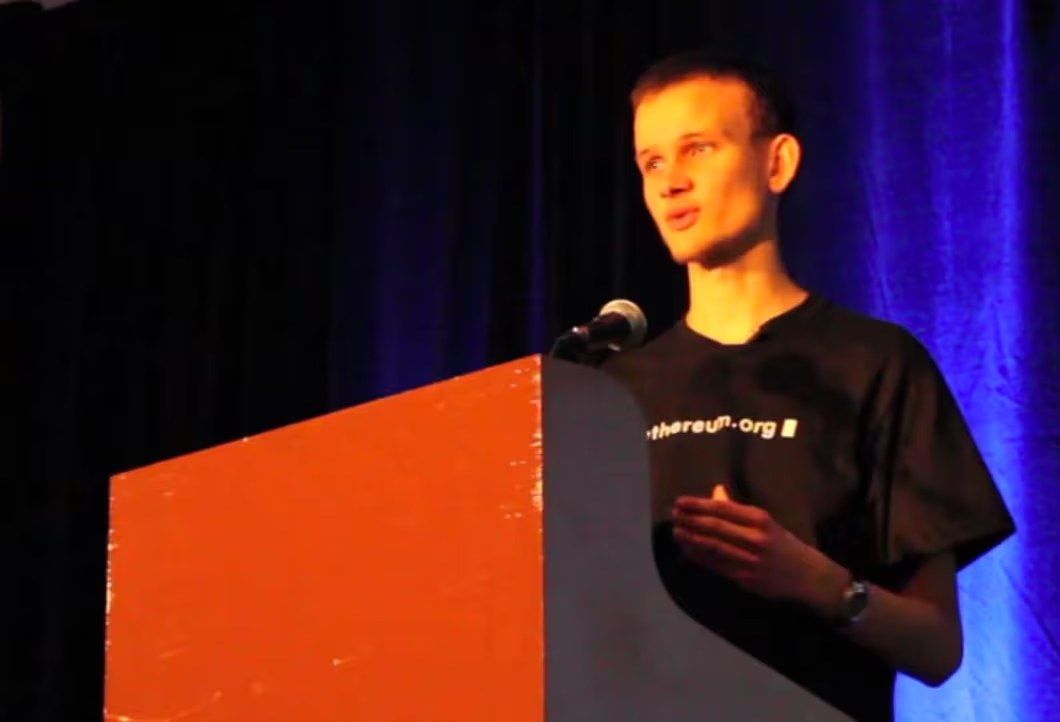
Vitalik Buterin introducing Ethereum at the 2014 Miami Bitcoin Summit
Before funding Vitalik, Thiel had already shown interest and support for the early blockchain industry. In 2013, Founders Fund led a $2 million seed round for the crypto payment company BitPay. At that time, crypto payments were still in their infancy, and this was interpreted as top Silicon Valley funds beginning to explore "payment-side" crypto applications, betting on their compliance and merchant acceptance prospects.
Another well-known investment by Thiel in the cryptocurrency industry is Block.one and Bullish, with the former being the parent company of the public chain project EOS, and the latter being the crypto exchange launched by Block.one in 2021. In 2018, Block.one announced it had secured strategic investments from investors including Peter Thiel and Bitmain. In 2021, Block.one also led the incubation of the institutional crypto trading platform Bullish, which claimed to have raised approximately $10 billion, with Peter Thiel, Alan Howard, and Louis Bacon listed as early key supporters.
In 2019, the mining infrastructure company Layer1 announced it had secured $50 million in financing, with Peter Thiel as one of the investors. Layer1 aims to build comprehensive capabilities from power, chips to self-built mining farms in the US, aligning with Thiel's consistent investment preference for "infrastructure and upstream control."
In addition to supporting early crypto projects as an investor, the returns Thiel has gained from directly investing in cryptocurrencies may be even more astonishing. According to Reuters, as one of the earliest institutional investors in cryptocurrencies, Founders Fund began purchasing Bitcoin in large quantities as early as 2014 and liquidated its holdings before the cryptocurrency market crash in 2022, achieving approximately $1.8 billion in returns.
Additionally, sources indicate that Founders Fund resumed buying cryptocurrencies in the summer of 2023, investing $200 million to purchase BTC and ETH over a few months. Reuters was unable to ascertain the average prices of these purchases, but at that time, BTC prices were below $30,000, while ETH fluctuated between $1,500 and $1,900. Reuters commented, "Thiel's love for cryptocurrencies aligns with his interest in libertarianism, small government, and technological innovation."
Increasing Investment in Cryptocurrencies
In recent years, Thiel has repeatedly endorsed Bitcoin. In public appearances, he has praised Bitcoin for its function as "digital gold," calling it a hedge against inflation and central bank policies. In October 2021, at an event hosted by Lincoln Network in Miami, Thiel was invited to share his views on cryptocurrencies, central banks, and macro issues, expressing that he felt under-invested in Bitcoin and stated, "All you have to do is buy Bitcoin."
It has proven that Thiel's words are not empty. In recent years, Thiel seems to have begun increasing his investment in cryptocurrencies, with the investment strategy and focus of Founders Fund shifting towards the crypto sector.
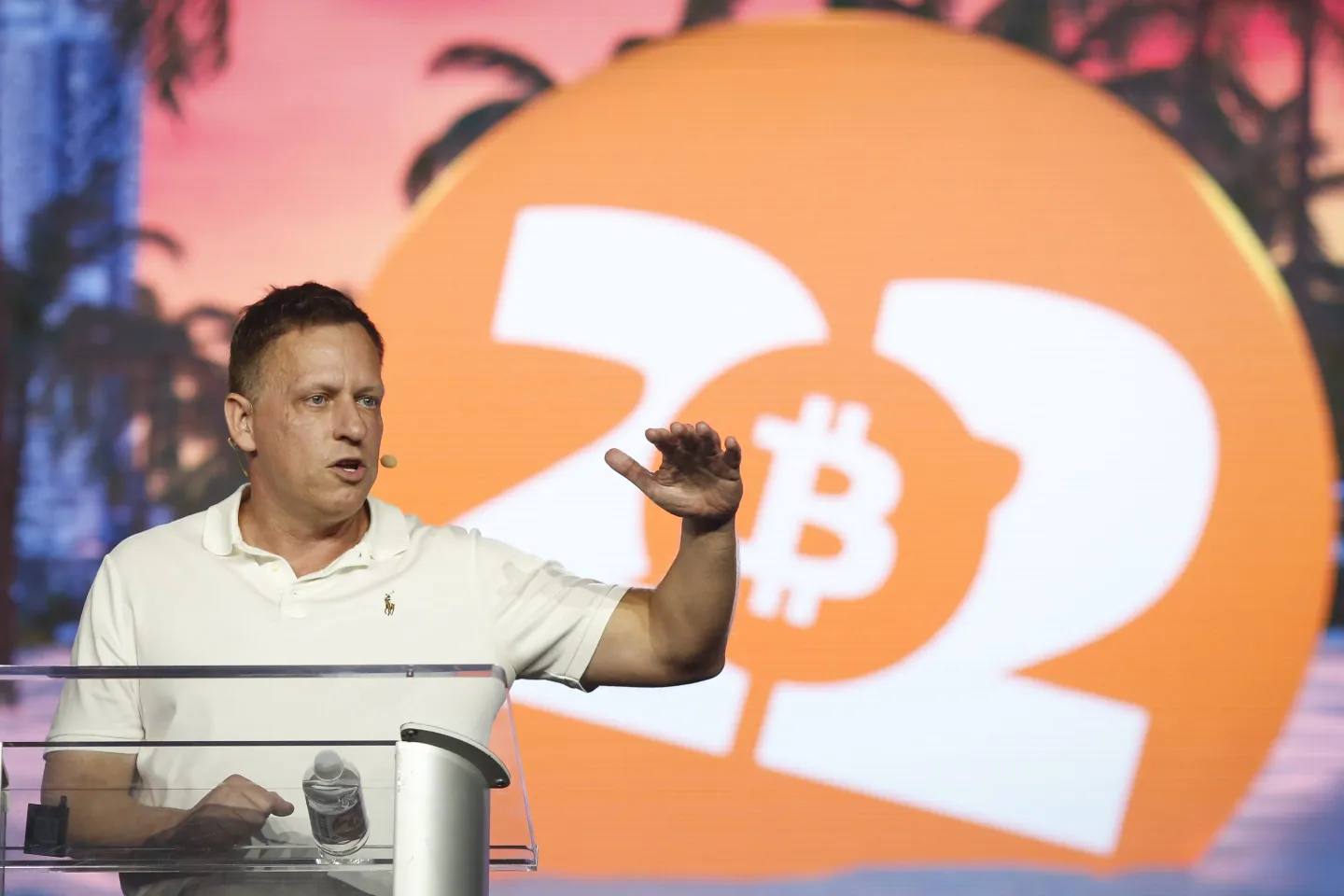
Thiel praises Bitcoin at the 2022 Bitcoin Conference held in Miami, Florida.
In May 2023, former Pantera co-CIO Joey Krug joined Founders Fund as a partner. Krug stated on X platform: "I will focus on developing the Founders Fund's crypto strategy for the next decade while looking for the next wave of crypto startups and founders worth supporting." With Krug's addition, Founders Fund began to shift towards treating crypto as a conventional investment category.
Amid the trend of publicly listed companies building crypto treasuries, Thiel once again became a "behind-the-scenes winner." In mid-2025, Bitcoin mining company Bitmine Immersion Technologies announced a shift in its "corporate treasury" strategy towards Ethereum (ETH), appointing Fundstrat co-founder and renowned macro analyst Tom Lee as chairman, and launched a $250 million private placement. In mid-July, as one of the company's most significant shareholders, Thiel disclosed that he held approximately 9.1% of the shares. Following the announcement, the company's stock price surged nearly 15% in early trading.
According to data from Strategicethreserve, the Ethereum holdings of the US-listed company Bitmine have reached approximately 1.2 million coins, with a market value exceeding $5 billion, ranking first among Ethereum treasury companies, significantly ahead of the second-ranked Sharplink Gaming, which holds about 728,800 Ethereum worth approximately $3.25 billion.
Additionally, Thiel's early investments from four years ago are beginning to pay off. In August 2025, Bullish went public on the New York Stock Exchange and saw a significant increase on its first day, marking the official entry of Thiel's long-term bet on "institutional trading infrastructure" into the public capital market.
Power Broker: Thiel's Political Influence
In addition to achieving commercial success in fintech and cryptocurrency, Peter Thiel's influence has also reached the power centers of Washington. As a "super capitalist in the tech world," Thiel's role in American politics has become increasingly significant, as he has long been building his influence in the White House and Congress through candidate funding and establishing political-business connections.
As one of the few Republican supporters in Silicon Valley, he publicly backed Trump during the 2016 presidential election. In an environment where nearly everyone in Silicon Valley opposed Trump, Thiel's vocal support was indeed an anomaly, but he identified as a "self-proclaimed libertarian who believes in capitalism," and similarly valued Trump's anti-establishment stance.
In terms of political donations and networking, Thiel has been quite active. In 2016, as a key ally of Trump, Thiel donated $1.25 million to Trump's campaign team and became a member of the presidential transition team.
Moreover, the Los Angeles Times noted that he has long invested in Republican candidates, particularly the new generation of conservative politicians related to the tech industry. For instance, he donated a record $15 million to his protégé—former employee and current US Vice President JD Vance, marking the highest single donation in the Ohio Senate race's history. He also facilitated a meeting between Vance and Trump, helping Vance secure Trump's endorsement, which indirectly helped Trump find a "golden partner" for his later presidential campaign and second term.
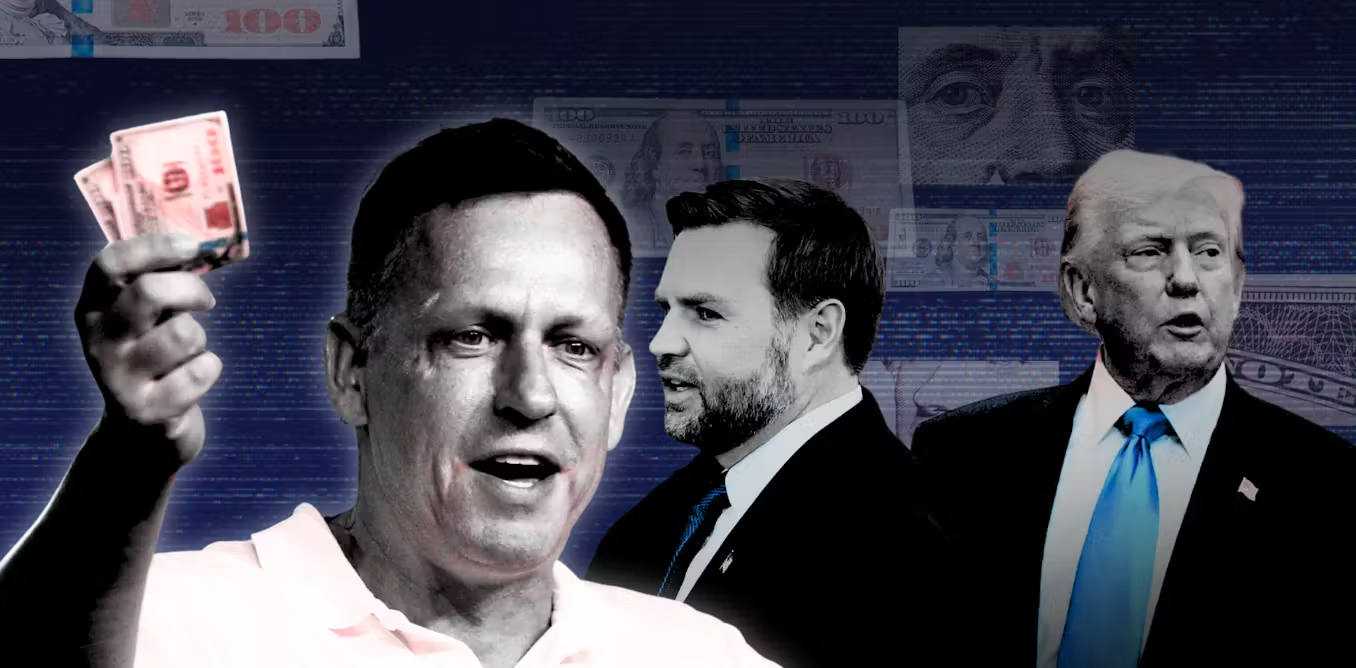
Thiel, JD Vance, and Trump
Another Silicon Valley newcomer, Blake Masters, who previously served as COO of Thiel's office and co-authored Thiel's entrepreneurial book "Zero to One," also received Thiel's support and mentorship in his political endeavors. Thiel has invested over $10 million in super political action committees supporting both of their campaigns.
Several major US media outlets have described Thiel as a "power broker" or "big donor" in the Republican tech sector. Business Insider even referred to him as the "Republican kingmaker," being an early supporter of Trump and the first tech investor in Silicon Valley to fulfill donations in 2016.
It is worth mentioning that Thiel's attitude towards Trump's camp has changed. In 2023, The Guardian reported that Thiel, in an interview with The Atlantic, stated that his "support for Trump's decisions feels like a 'disjointed cry for help,' and the developments are much crazier and more dangerous than imagined." The report also mentioned that Trump was unhappy when he called Thiel earlier in 2023 to solicit a $10 million donation and was refused. Ultimately, Thiel did not participate in funding the 2024 political campaign.
免责声明:本文章仅代表作者个人观点,不代表本平台的立场和观点。本文章仅供信息分享,不构成对任何人的任何投资建议。用户与作者之间的任何争议,与本平台无关。如网页中刊载的文章或图片涉及侵权,请提供相关的权利证明和身份证明发送邮件到support@aicoin.com,本平台相关工作人员将会进行核查。




